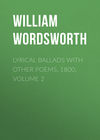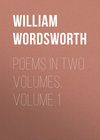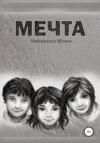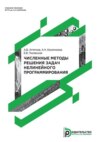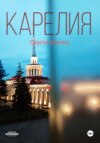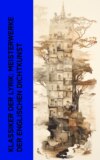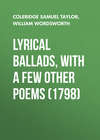Читать книгу: «Lyrical Ballads with Other Poems, 1800, Volume 2», страница 3
Шрифт:
INSCRIPTION
For the Spot where the HERMITAGE stood
on St. Herbert's Island, Derwent-Water
If thou in the dear love of some one friend
Hast been so happy, that thou know'st what thoughts
Will, sometimes, in the happiness of love
Make the heart sink, then wilt thou reverence
This quiet spot. – St. Herbert hither came
And here, for many seasons, from the world
Remov'd, and the affections of the world
He dwelt in solitude. He living here,
This island's sole inhabitant! had left
A Fellow-labourer, whom the good Man lov'd
As his own soul; and when within his cave
Alone he knelt before the crucifix
While o'er the lake the cataract of Lodore
Peal'd to his orisons, and when he pac'd
Along the beach of this small isle and thought
Of his Companion, he had pray'd that both
Might die in the same moment. Nor in vain
So pray'd he: – as our Chronicles report,
Though here the Hermit number'd his last days,
Far from St. Cuthbert his beloved friend,
Those holy men both died in the same hour.
INSCRIPTION
For the House (an Outhouse) on the Island at Grasmere
Rude is this Edifice, and Thou hast seen
Buildings, albeit rude, that have maintain'd
Proportions more harmonious, and approach'd
To somewhat of a closer fellowship
With the ideal grace. Yet as it is
Do take it in good part; for he, the poor
Vitruvius of our village, had no help
From the great city; never on the leaves
Of red Morocco folio saw display'd
The skeletons and pre-existing ghosts
Of Beauties yet unborn, the rustic Box,
Snug Cot, with Coach-house, Shed and Hermitage.
It is a homely pile, yet to these walls
The heifer comes in the snow-storm, and here
The new-dropp'd lamb finds shelter from the wind.
And hither does one Poet sometimes row
His pinnace, a small vagrant barge, up-piled
With plenteous store of heath and wither'd fern,
A lading which he with his sickle cuts
Among the mountains, and beneath this roof
He makes his summer couch, and here at noon
Spreads out his limbs, while, yet unborn, the sheep
Panting beneath the burthen of their wool
Lie round him, even as if they were a part
Of his own household: nor, while from his bed
He through that door-place looks toward the lake
And to the stirring breezes, does he want
Creations lovely as the work of sleep,
Fair sights, and visions of romantic joy.
To a SEXTON
Let thy wheel-barrow alone.
Wherefore, Sexton, piling still
In thy bone-house bone on bone?
Tis already like a hill
In a field of battle made,
Where three thousand skulls are laid.
– These died in peace each with the other,
Father, Sister, Friend, and Brother.
Mark the spot to which I point!
From this platform eight feet square
Take not even a finger-joint:
Andrew's whole fire-side is there.
Here, alone, before thine eyes,
Simon's sickly Daughter lies
From weakness, now, and pain defended,
Whom he twenty winters tended.
Look but at the gardener's pride,
How he glories, when he sees
Roses, lilies, side by side,
Violets in families.
By the heart of Man, his tears,
By his hopes and by his fears,
Thou, old Grey-beard! art the Warden
Of a far superior garden.
Thus then, each to other dear,
Let them all in quiet lie,
Andrew there and Susan here,
Neighbours in mortality.
And should I live through sun and rain
Seven widow'd years without my Jane,
O Sexton, do not then remove her,
Let one grave hold the Lov'd and Lover!
ANDREW JONES
I hate that Andrew Jones: he'll breed
His children up to waste and pillage.
I wish the press-gang or the drum
With its tantara sound would come,
And sweep him from the village!
I said not this, because he loves
Through the long day to swear and tipple;
But for the poor dear sake of one
To whom a foul deed he had done,
A friendless Man, a travelling Cripple!
For this poor crawling helpless wretch
Some Horseman who was passing by,
A penny on the ground had thrown;
But the poor Cripple was alone
And could not stoop – no help was nigh.
Inch-thick the dust lay on the ground
For it had long been droughty weather:
So with his staff the Cripple wrought
Among the dust till he had brought
The halfpennies together.
It chanc'd that Andrew pass'd that way
Just at the time; and there he found
The Cripple in the mid-day heat
Standing alone, and at his feet
He saw the penny on the ground.
He stopp'd and took the penny up.
And when the Cripple nearer drew,
Quoth Andrew, "Under half-a-crown.
What a man finds is all his own,
And so, my Friend, good day to you."
And hence I said, that Andrew's boys
Will all be train'd to waste and pillage;
And wish'd the press-gang, or the drum
With its tantara sound, would come
And sweep him from the village!
The TWO THIEVES,
Or the last Stage of AVARICE
Oh now that the genius of Bewick were mine
And the skill which He learn'd on the Banks of the Tyne;
When the Muses might deal with me just as they chose
For I'd take my last leave both of verse and of prose.
What feats would I work with my magical hand!
Book-learning and books should be banish'd the land
And for hunger and thirst and such troublesome calls
Every ale-house should then have a feast on its walls.
The Traveller would hang his wet clothes on a chair
Let them smoke, let them burn, not a straw would he care.
For the Prodigal Son, Joseph's Dream and his Sheaves,
Oh what would they be to my tale of two Thieves!
Little Dan is unbreech'd, he is three birth-days old,
His Grandsire that age more than thirty times told,
There's ninety good seasons of fair and foul weather
Between them, and both go a stealing together.
With chips is the Carpenter strewing his floor?
It a cart-load of peats at an old Woman's door?
Old Daniel his hand to the treasure will slide,
And his Grandson's as busy at work by his side.
Old Daniel begins, he stops short and his eye
Through the lost look of dotage is cunning and sly.
'Tis a look which at this time is hardly his own,
But tells a plain tale of the days that are flown.
Dan once had a heart which was mov'd by the wires
Of manifold pleasures and many desires:
And what if he cherish'd his purse? 'Twas no more
Than treading a path trod by thousands before.
'Twas a path trod by thousands, but Daniel is one
Who went something farther than others have gone;
And now with old Daniel you see how it fares
You see to what end he has brought his grey hairs.
The pair sally forth hand in hand; ere the sun
Has peer'd o'er the beeches their work is begun:
And yet into whatever sin they may fall,
This Child but half knows it and that not at all.
They hunt through the street with deliberate tread,
And each in his turn is both leader and led;
And wherever they carry their plots and their wiles,
Every face in the village is dimpled with smiles.
Neither check'd by the rich nor the needy they roam,
For grey-headed Dan has a daughter at home;
Who will gladly repair all the damage that's done,
And three, were it ask'd, would be render'd for one.
Old Man! whom so oft I with pity have ey'd,
I love thee and love the sweet boy at thy side:
Long yet may'st thou live, for a teacher we see
That lifts up the veil of our nature in thee.
A whirl-blast from behind the hill
Rush'd o'er the wood with startling sound:
Then all at once the air was still,
And showers of hail-stones patter'd round.
Where leafless Oaks tower'd high above,
I sate within an undergrove
Of tallest hollies, tall and green,
A fairer bower was never seen.
From year to year the spacious floor
With wither'd leaves is cover'd o'er,
You could not lay a hair between:
And all the year the bower is green.
But see! where'er the hailstones drop
The wither'd leaves all skip and hop,
There's not a breeze – no breath of air —
Yet here, and there, and every where
Along the floor, beneath the shade
By those embowering hollies made,
The leaves in myriads jump and spring,
As if with pipes and music rare
Some Robin Good-fellow were there,
And all those leaves, that jump and spring,
Were each a joyous, living thing.
Oh! grant me Heaven a heart at ease
That I may never cease to find,
Even in appearances like these
Enough to nourish and to stir my mind!
SONG
FOR THE WANDERING JEW
Though the torrents from their fountains
Roar down many a craggy steep,
Yet they find among the mountains
Resting-places calm and deep.
Though almost with eagle pinion
O'er the rocks the Chamois roam.
Yet he has some small dominion
Which no doubt he calls his home.
If on windy days the Raven
Gambol like a dancing skiff,
Not the less he loves his haven
On the bosom of the cliff.
Though the Sea-horse in the ocean
Own no dear domestic cave;
Yet he slumbers without motion
On the calm and silent wave.
Day and night my toils redouble!
Never nearer to the goal,
Night and day, I feel the trouble,
Of the Wanderer in my soul.
RUTH
When Ruth was left half desolate,
Her Father took another Mate;
And so, not seven years old,
The slighted Child at her own will
Went wandering over dale and hill
In thoughtless freedom bold.
And she had made a pipe of straw
And from that oaten pipe could draw
All sounds of winds and floods;
Had built a bower upon the green,
As if she from her birth had been
An Infant of the woods.
There came a Youth from Georgia's shore,
A military Casque he wore
With splendid feathers drest;
He brought them from the Cherokees;
The feathers nodded in the breeze
And made a gallant crest.
From Indian blood you deem him sprung:
Ah no! he spake the English tongue
And bare a Soldier's name;
And when America was free
From battle and from jeopardy
He cross the ocean came.
With hues of genius on his cheek
In finest tones the Youth could speak.
– While he was yet a Boy
The moon, the glory of the sun,
And streams that murmur as they run
Had been his dearest joy.
He was a lovely Youth! I guess
The panther in the wilderness
Was not so fair as he;
And when he chose to sport and play,
No dolphin ever was so gay
Upon the tropic sea.
Among the Indians he had fought,
And with him many tales he brought
Of pleasure and of fear,
Such tales as told to any Maid
By such a Youth in the green shade
Were perilous to hear.
He told of Girls, a happy rout,
Who quit their fold with dance and shout
Their pleasant Indian Town
To gather strawberries all day long,
Returning with a choral song
When day-light is gone down.
He spake of plants divine and strange
That ev'ry day their blossoms change,
Ten thousand lovely hues!
With budding, fading, faded flowers
They stand the wonder of the bowers
From morn to evening dews.
He told of the Magnolia,6 spread
High as a cloud, high over head!
The Cypress and her spire,
Of flowers that with one scarlet gleam7
Cover a hundred leagues and seem
To set the hills on fire.
The Youth of green Savannahs spake,
And many an endless endless lake
With all its fairy crowds
Of islands that together lie
As quietly as spots of sky
Among the evening clouds:
And then he said "How sweet it were
A fisher or a hunter there,
A gardener in the shade,
Still wandering with an easy mind
To build a household fire and find
A home in every glade."
"What days and what sweet years! Ah me!
Our life were life indeed, with thee
So pass'd in quiet bliss,
And all the while" said he "to know
That we were in a world of woe.
On such an earth as this!"
And then he sometimes interwove
Dear thoughts about a Father's love,
"For there," said he, "are spun
Around the heart such tender ties
That our own children to our eyes
Are dearer than the sun."
Sweet Ruth! and could you go with me
My helpmate in the woods to be,
Our shed at night to rear;
Or run, my own adopted bride,
A sylvan huntress at my side
And drive the flying deer.
"Beloved Ruth!" No more he said
Sweet Ruth alone at midnight shed
A solitary tear,
She thought again – and did agree
With him to sail across the sea,
And drive the flying deer.
"And now, as fitting is and right,
We in the Church our faith will plight,
A Husband and a Wife."
Even so they did; and I may say
That to sweet Ruth that happy day
Was more than human life.
Through dream and vision did she sink,
Delighted all the while to think
That on those lonesome floods
And green Savannahs she should share
His board with lawful joy, and bear
His name in the wild woods.
But, as you have before been told,
This Stripling, sportive gay and bold,
And, with his dancing crest,
So beautiful, through savage lands
Had roam'd about with vagrant bands
Of Indians in the West.
The wind, the tempest roaring high,
The tumult of a tropic sky
Might well be dangerous food.
For him, a Youth to whom was given
So much of earth so much of Heaven,
And such impetuous blood.
Whatever in those climes he found
Irregular in sight or sound
Did to his mind impart
A kindred impulse, seem'd allied
To his own powers, and justified
The workings of his heart.
Nor less to feed voluptuous thought
The beauteous forms of Nature wrought,
Fair trees and lovely flowers;
The breezes their own languor lent,
The stars had feelings which they sent
Into those magic bowers.
Yet, in his worst pursuits, I ween,
That sometimes there did intervene
Pure hopes of high intent:
For passions link'd to forms so fair
And stately, needs must have their share
Of noble sentiment.
But ill he liv'd, much evil saw
With men to whom no better law
Nor better life was known;
Deliberately and undeceiv'd
Those wild men's vices he receiv'd,
And gave them back his own.
His genius and his moral frame
Were thus impair'd, and he became
The slave of low desires;
A man who without self-controul
Would seek what the degraded soul
Unworthily admires.
And yet he with no feign'd delight
Had woo'd the Maiden, day and night
Had luv'd her, night and morn;
What could he less than love a Maid
Whose heart with so much nature play'd
So kind and so forlorn?
But now the pleasant dream was gone,
No hope, no wish remain'd, not one,
They stirr'd him now no more,
New objects did new pleasure give,
And once again he wish'd to live
As lawless as before.
Meanwhile as thus with him it fared.
They for the voyage were prepared
And went to the sea-shore,
But, when they thither came, the Youth
Deserted his poor Bride, and Ruth
Could never find him more.
"God help thee Ruth!" – Such pains she had
That she in half a year was mad
And in a prison hous'd,
And there, exulting in her wrongs,
Among the music of her songs
She fearfully carouz'd.
Yet sometimes milder hours she knew,
Nor wanted sun, nor rain, nor dew,
Nor pastimes of the May,
They all were with her in her cell,
And a wild brook with chearful knell
Did o'er the pebbles play.
When Ruth three seasons thus had lain
There came a respite to her pain,
She from her prison fled;
But of the Vagrant none took thought,
And where it liked her best she sought
Her shelter and her bread.
Among the fields she breath'd again:
The master-current of her brain
Ran permanent and free,
And to the pleasant Banks of Tone8
She took her way, to dwell alone
Under the greenwood tree.
The engines of her grief, the tools
That shap'd her sorrow, rocks and pools,
And airs that gently stir
The vernal leaves, she loved them still,
Nor ever tax'd them with the ill
Which had been done to her.
A Barn her winter bed supplies,
But till the warmth of summer skies
And summer days is gone,
(And in this tale we all agree)
She sleeps beneath the greenwood tree,
And other home hath none.
If she is press'd by want of food
She from her dwelling in the wood
Repairs to a road side,
And there she begs at one steep place,
Where up and down with easy pace
The horsemen-travellers ride.
That oaten pipe of hers is mute
Or thrown away, but with a flute
Her loneliness she cheers;
This flute made of a hemlock stalk
At evening in his homeward walk
The Quantock Woodman hears.
I, too have pass'd her on the hills
Setting her little water-mills
By spouts and fountains wild,
Such small machinery as she turn'd
Ere she had wept, ere she had mourn'd
A young and happy Child!
Farewel! and when thy days are told
Ill-fated Ruth! in hallow'd mold
Thy corpse shall buried be,
For thee a funeral bell shall ring,
And all the congregation sing
A Christian psalm for thee.
LINES
Written with a Slate-pencil upon a Stone, the largest of a heap lying near a deserted Quarry, upon one of the Islands at Rydale
Stranger! this hillock of mishapen stones
Is not a ruin of the ancient time,
Nor, as perchance thou rashly deem'st, the Cairn
Of some old British Chief: 'tis nothing more
Than the rude embryo of a little dome
Or pleasure-house, which was to have been built
Among the birch-trees of this rocky isle.
But, as it chanc'd, Sir William having learn'd
That from the shore a full-grown man might wade,
And make himself a freeman of this spot
At any hour he chose, the Knight forthwith
Desisted, and the quarry and the mound
Are monuments of his unfinish'd task. —
The block on which these lines are trac'd, perhaps,
Was once selected as the corner-stone
Of the intended pile, which would have been
Some quaint odd play-thing of elaborate skill,
So that, I guess, the linnet and the thrush,
And other little builders who dwell here,
Had wonder'd at the work. But blame him not,
For old Sir William was a gentle Knight
Bred in this vale to which he appertain'd
With all his ancestry. Then peace to him
And for the outrage which he had devis'd
Entire forgiveness. – But if thou art one
On fire with thy impatience to become
An Inmate of these mountains, if disturb'd
By beautiful conceptions, thou hast hewn
Out of the quiet rock the elements
Of thy trim mansion destin'd soon to blaze
In snow-white splendour, think again, and taught
By old Sir William and his quarry, leave
Thy fragments to the bramble and the rose,
There let the vernal slow-worm sun himself,
And let the red-breast hop from stone to stone.
In the School of – is a tablet on which are inscribed, in gilt letters, the names of the federal persons who have been Schoolmasters there since the foundation of the School, with the time at which they entered upon and quitted their office. Opposite one of those names the Author wrote the following lines.
If Nature, for a favorite Child
In thee hath temper'd so her clay,
That every hour thy heart runs wild
Yet never once doth go astray,
Read o'er these lines; and then review
This tablet, that thus humbly rears
In such diversity of hue
Its history of two hundred years.
– When through this little wreck of fame,
Cypher and syllable, thine eye
Has travell'd down to Matthew's name,
Pause with no common sympathy.
And if a sleeping tear should wake
Then be it neither check'd nor stay'd:
For Matthew a request I make
Which for himself he had not made.
Poor Matthew, all his frolics o'er,
Is silent as a standing pool,
Far from the chimney's merry roar,
And murmur of the village school.
The sighs which Matthew heav'd were sighs
Of one tir'd out with fun and madness;
The tears which came to Matthew's eyes
Were tears of light, the oil of gladness.
Yet sometimes when the secret cup
Of still and serious thought went round
It seem'd as if he drank it up,
He felt with spirit so profound.
– Thou soul of God's best earthly mould,
Thou happy soul, and can it be
That these two words of glittering gold
Are all that must remain of thee?
6.Magnolia grandiflora.
7.The splendid appearance of these scarlet flowers, which are scattered with such profusion over the Hills in the Southern parts of North America is frequently mentioned by Bartram in his Travels.
8.The Tone is a River of Somersetshire at no great distance from the Quantock Hills. These Hills, which are alluded to a few Stanzas below, are extremely beautiful, and in most places richly covered with Coppice woods.
Покупайте книги и получайте бонусы в Литрес, Читай-городе и Буквоеде.
Участвовать в бонусной программеВозрастное ограничение:
12+Дата выхода на Литрес:
22 октября 2017Объем:
90 стр. 1 иллюстрацияПравообладатель:
Public Domain
